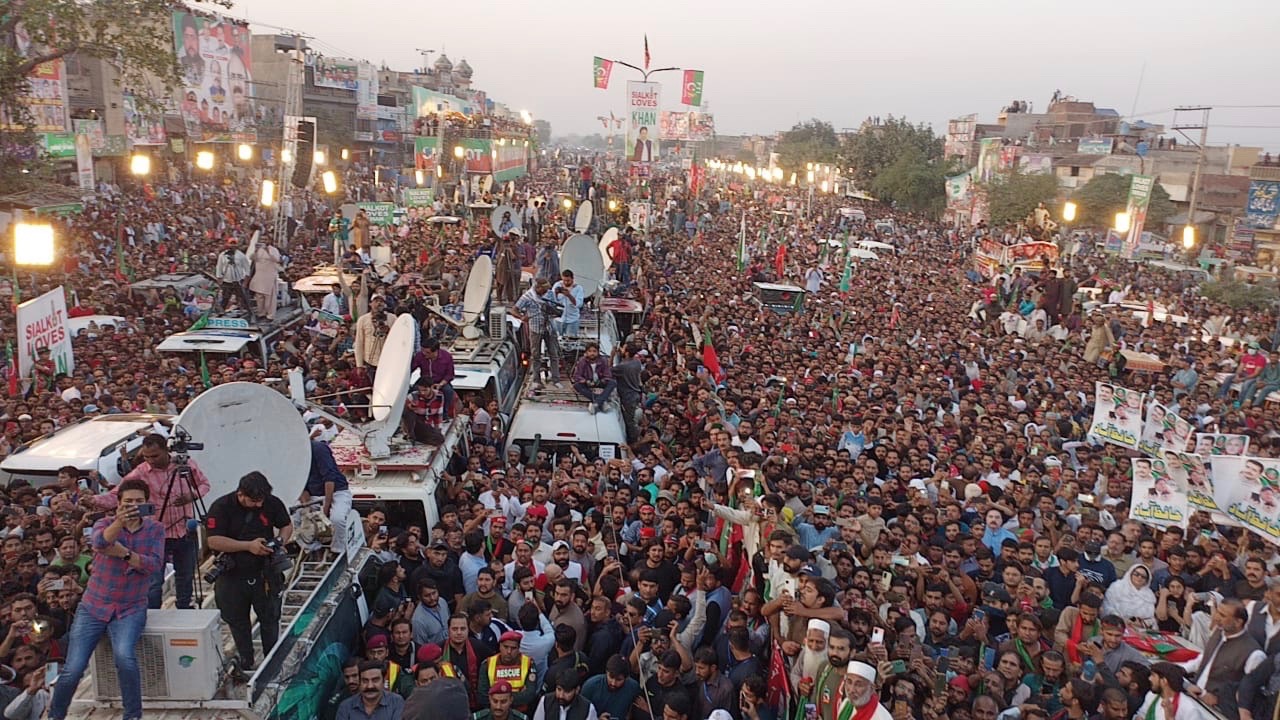Days after an assassination attempt on former PM Imran Khan, his party, the Paksitan Tehreek-e-Insaf (PTI), resumed its long march on Tuesday, November 8. Khan’s supporters marched around the roads of national capital, Islamabad, blocking roads and the highway linked to the international airport, reported Reuters.
The march, which began on October 28, was disrupted after the assassination attempt on Khan in the Wazirabad district of Punjab province on November 3. Khan was rushed to a hospital in Lahore where he underwent surgery for bullet injuries and was discharged on November 6. A PTI worker, Moazzam Gondal, was killed in the attack.
“Our march will resume on Tuesday from the place in Wazirabad where I and 11 other people were shot, and where Moazzam was martyred,” Khan had announced via social media on November 6. He added that he will not be able to physically join the march as he is recovering from the injuries he sustained in the attack.
The attack on Imran Khan shocked the country, which is already undergoing political instability and an economic downturn. Khan served as the 22nd prime minister of Pakistan before his ouster in April this year.
WARNING: GRAPHIC CONTENT
Pakistan's former prime minister, Imran Khan, was shot in the shin when his anti-government convoy came under attack, in what his aides said was a clear assassination attempt https://t.co/ncODIujjTA pic.twitter.com/DLM9sXj1EY— Reuters (@Reuters) November 3, 2022
Current Prime Minister Shehbaz Sharif, who replaced Khan in April, condemned the firing on the PTI chairman and directed Interior Minister Rana Sanaullah to investigate the incident.
I condemn the incident of firing on PTI Chairman Imran Khan in the strongest words. I have directed Interior Minister for an immediate report on the incident.
I pray for the recovery and health of PTI chairman & other injured people. 1/2
— Shehbaz Sharif (@CMShehbaz) November 3, 2022
Attempt on Khan’s life triggers protests
The assassination attempt on Khan triggered protests, with thousands of his supporters hitting the streets shouting anti-military and anti-government slogans in cities including Islamabad, Quetta, Karachi, Lahore, Faisalabad, Rawalpindi, Multan, Peshawar, and Gujranwala.
In the aftermath of the attack, Asad Umar, secretary general of PTI, alleged that high-ranking government and military officials were behind the attack. Subsequently, news channels were advised by the Pakistan Electronic and Media Regulatory Authority to stop airing these allegations.
The Human Rights Commission of Pakistan expressed alarm over the instigation to mob violence following the attack on Khan. The Commission said that “calls for revenge” by senior PTI leaders were in contravention of “democratic processes and rule of law.”
Army, civil, and government relations: new leaf or old ways?
Since his ouster in April, Imran Khan has led mobilizations and protest marches in the country. He has also gone on record accusing the Pakistani military and intelligence agencies of being involved in the country’s politics and his ouster. However, Khan himself is a product of the army-state nexus in Pakistan, several commentators have noted.
On October 27, for the first time in Pakistan’s history, the head of the Inter-Services Intelligence (ISI) addressed the media directly in a press conference to counter Khan’s narrative and his repeated accusations against the military.
According to Taimur Rahman, professor of political science at LUMS, “The ISI press conference was a mistake, the impression it has created is that PTI and ISI are at loggerheads now…the political climate is worsening. The result of these developments is that public perception among PTI followers now favors the narrative that the army or ISI is responsible for the gun attack on Khan.” (translated)
Attempted Assassination of Imran Khan https://t.co/8aAaz4Esxd via @YouTube
— Dr. Taimur Rahman (@Taimur_Laal) November 3, 2022
“Clear that there is no support left for [the] military’s involvement in politics. If [the] current impasse ends with [a] new deal among political parties, wheels of history will move forward. If Generals become main arbitrators, we will remain caught in a vicious cycle. Decisive moments ahead,” activist and historian Ammar Ali Jan tweeted.
Political violence has marked the history of Pakistan since the country’s formation in 1947. Its first Prime Minister Liaquat Ali Khan was shot twice and murdered in October 1951. On December 27, 2007, a suicide bomber murdered Benazir Bhutto, Pakistan’s first female prime minister. In 2011, Punjab Governor Salman Taseer was gunned down by his bodyguard for opposing blasphemy laws.
Supporters of Imran Khan are now demanding a free and fair investigation into the incident.





